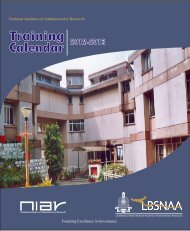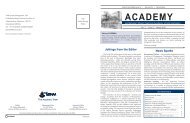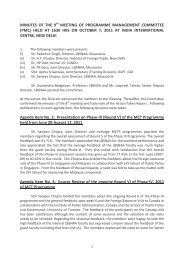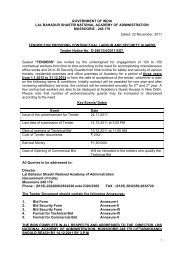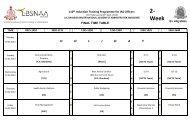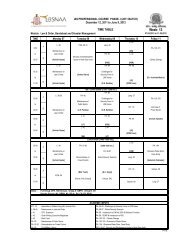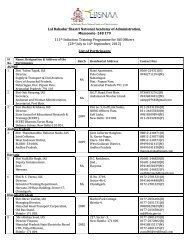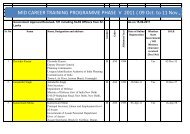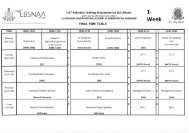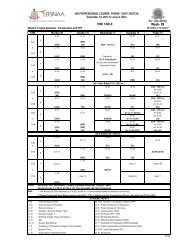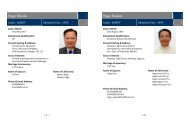AGENDA ITEM 3 - lbsnaa
AGENDA ITEM 3 - lbsnaa
AGENDA ITEM 3 - lbsnaa
You also want an ePaper? Increase the reach of your titles
YUMPU automatically turns print PDFs into web optimized ePapers that Google loves.
i. Among all public policy institutions in the Asian region, LKY NUS has thehighest ranking as per the conventionally accepted rankings. It ranks atnumber 34 in the current THE (Times Higher Education) internationaluniversity rankings and ranks at number 31 as per the current QS(Quatrelli Systems) international university rankings.ii. LKY NUS has partnered with DoPT for the DFFT nomination scheme andalso the recent program on urban issues. As such, it has adequateunderstanding of India and the Indian context to provide inputs gearedto the Phase III requirements.iii. The foreign exposure visit is not a regular academic program. On thecontrary, it is a totally customized program being developed specificallyfor the Academy based on the inputs provided by the Academy to LKYiv. LKY has a number of international tie-ups for its various academicprograms.v. Singapore is largely an English speaking country.vi. The Singapore civil service is also widely recognized as an efficientbureaucracy and the visit will enable the participants to interact withofficials of the Singapore civil servicevii. As per telephonic information obtained from Balmer and Lawrie earlierthis week, the average cost of travel to Singapore as of now will bewithin Rs 28,000. The cost of travel of South Korea for the group whichis presently in South Korea is approximately Rs 44,000 per head. Forone hundred participants, this translates into a saving of approximatelyRs 16 lakh on travel costsviii. A cost comparison between KDI South Korea and LKY is presentedbelow -Item KDI (USD) LKY (Sing $)Total fees (all inclusive,117,196 175,833excluding local board andlodging and travel to and fromIndia)INR equivalent @ exchangerate of 45 INR/USD and 36INR/Sing$52,73,820 63,29,991Travel To and From India(current rates)45,69,581 28,00,000ApproxTotal 98,43,401 91,29,9916
Proposal:In view of the above considerations, it is proposed that-The foreign exposure visit of the Phase III program be conducted in Singapore– Malaysia through LKYSPP on a nomination basis.7
<strong>ITEM</strong> 3 –Update on preparation for Round VI of the Phase IV of MCTProgramme to be held from August 22-October 14 2011Foreign exposure Visit for Phase IV (Round 6)The Phase IV Mid-Career Training Program (MCTP) for IAS officers hasan inbuilt component of a 2 week foreign exposure visit. Four rounds of thePhase-IV have been conducted so far and the fifth round is underway. Sincethe inception of Program in 2007, we have been taking this group to SouthKorea with Korea Development Institute (KDI) at Seoul working as the anchorinstitution for organizing and running this component of the program.In the various feedback sessions with the participants, it has beensuggested that the Academy should also consider organizing the foreignexposure visit in other countries that might offer greater opportunities forlearning in the Indian policy and governmental context.Consequently, the Academy has been considering alternativedestinations for the foreign exposure visit for the Phase-IV participants. In thiscontext, we explored the possibility of collaborating with The Civil ServicesCollege (UK); ENAP (Brazillian National School of Public Administration-EscolaNacional de Administracal Publica) and IPAC (The Institute of PublicAdministration, Canada). The financial proposal from ENAP is still awaited andshall be placed in the scheduled meeting of the PMC. The UK civil servicescollege declined to take a group size beyond 30, on account of logisticalconstraints.A summary of the country parameters/ institutional advantages andfinancial implications for each of the alternative destinations is available atAnnexure E & F for the ready reference of the PMC.The PMC may like to take a considered view on the following issues giventhe fact that the foreign exposure visit of the forthcoming Phase IV isscheduled from 12 th - 24 th September, 2011:(i) Take a strategic decision on the need for diversification in thedestinations for our foreign exposure visits to include countries otherthan South Korea.(ii) Provided the decision to issue (i) is in the affirmative, the PMC may takea view on the possible alternative in light of the comparativeadvantages presented in the Annexure E & F.8
We have received inquiries from MIT, HKS and Yale. They were givenclarifications on telephone on various issues including our past experiencesetc.The proposed Foreign Exposure Visit would be of 9 days includingSaturday and Sunday. The Foreign Exposure Visit would start on October 10and would continue till October 18, 2011. On completion of the visit theofficers will depart from US on October 19 and reach New Delhi on 20 October,2011. Since only one working day remains in this week, it is proposed to startthe domestic component on October 24 till November 11, 2011. During thisperiod there are three holidays namely Diwali, Guru Nanak Jayanti and Id UlZuha. Thus effectively there are only 12 working days. We propose to useSaturdays as working days thereby raising number of working days to 14.Every day there will be four sessions of 75 minutes each. After removingsessions earmarked for inaugural and valedictory programme, we will have 50sessions available in the domestic component of Phase V 2011. In order tomake learning participatory, of the 50 sessions, 10 sessions have beenearmarked for participants to share their ‘Insight’, in 8 sessions theparticipants will organize a workshop on Governance Issues. In remaining 32sessions, prominent speakers will be invited to address the participants.The Course Design for the programme will be quite similar to what wasfollowed in the last round. On the basis of inputs received during the lastround of Phase V, the Course Design will be finalized. Some of this will becovered during the Foreign exposure visit. These are included in RFPDocument which is annexed. The last date for submitting a proposal is June10, 2011. The proposals received will be examined in one week andsubmitted for approval by first week of July 2011.The participants will bring with them rich experience of diverse areas ofGovernance. The Academy is in the midst of preparation of Course Design,Time Table and selecting the Guest Speakers. LBSNAA will share all thesedetails with the participants and request them to join the Sessions as theAnchors, if they feel they have relevant experience to share with others.The participants would be expected to bring a Policy/Strategy Paper inan area of their choice. This could include strategy for implementingrecommendations of Administrative Reforms Commission. A large number ofthese have been examined and accepted by a group of Ministers in the CentralGovernment. Their implementation in Centre and States may havegovernance challenges that need to be appreciated. They would be asked topresent their ideas in Sessions titled “Insights”.11
Taking participants as resource persons, the participants would beasked to organize a two days Governance Workshop during their stay. Theworkshop would be run by the participants, who would be divided into fourgroups. Each group would be asked to identify three to four most importantgovernance challenges that the group would like to address during theircareer. Each group would be expected to write a paper on the challengesidentified by them. These recommendations would be ratified in a plenaryand final paper consolidating the suggestions will be written by theparticipants. This paper would be sent to the relevant Ministries includingMinistry of Personnel, Cabinet Secretariat and PMO for their consideration.The entire program will be participative where environment will becreated for learning from each other. The participants would be asked toreflect on their experiences and write a paper to share it with others. Some ofthe best papers may be published in the Academy’s quarterly Journal ‘TheAdministrator’.The PMC may kindly take note of above and give suggestions fororganizing the Phase V.12
Chairman and Managing Director, Food Corporation of India, Ms. MadhuKishwar, Editor, Manushi, Shri Rathin Roy, Director, International PolicyCentre for Inclusive Growth, UNDP, Brasilia, Prof. Arvind Panagariya,Professor of Economics, Columbia University, Shri Rahul Gandhi, MP, ShriGajendra Haldea, Advisor to Dy. Chairman, Planning Commission, Shri KaushikBasu, Chief Economic Adviser, Ministry of Finance, Prof. Sudipto Mundle,Emeritus Professor, NIPFP, Dr. M. Govinda Rao, Director, NIPFP, ShriGurcharan Das, Author and Management Guru, Shri G.K. Pillai, Union HomeSecretary, Prof. Bharat Karnad, Centre for Policy Research, Shri R.S. Sharma,DG, UIDAI, Shri Kiran Karnik, former President of NASSCOM, Dr. PrajapatiTrivedi, Secretary, Performance Management and Smt. Alka Sirohi, Secretary,Ministry of Personnel, Public Grievances and Pensions. The summary of thesessional feedback for Weeks 1 to 6 may be perused below:(average feedback)Week LBSNAA Guest IIMA KDI NIPFP OverallFaculty Faculty Faculty Faculty1 78.18% 72.71% - - 75.44%2 - 88.80% 73.34% - 81.07%3 90.13% 77.00% 77.82% - 81.65%4 & 5 - - 81.00% 81.00%6 87.78% 74.52% - - 81.15%7 86.17% 74.44% 78.73% - 81.82% 80.29%4. All participants were asked to write a Korea Paper on an aspect of thecountry’s policy with a critique on its relevance for India. They have alsowritten a Policy Paper (in cohorts of 3-4) and the related Cabinet Note on asubject of their choice which has been evaluated by experts (former seniorcivil servants) based on the written document as well as presentations beforethe group. In extra-curricular activities, participants have done compulsorymorning activity during the course. They have also undertaken short treks,rafting as well as taken part in various Academy activities alongside the OfficerTrainees of the Phase I.5. The Foreign Exposure Visit organized this year, in association withKorea Development Institute, was more effective compared to the previous14
ound. We had sought and received the support of the Ministry of ExternalAffairs to organize interactions with senior policy makers in Korea. A visit tothe office of Prime Minister was also arranged where the participants werebriefed about the organization structure of government in Korea and thepolicy coordination role played by the PMO. The Academy also obtainedfeedback for all sessions taken by KDI faculty as well as the site visits. Thesame is being shared with KDI for their information and further action. TheAcademy would also be making some suggestions to KDI to make futureprogrammes more effective. The KDI was also asked to video recordclassroom sessions and the copy of the same is available with the Academy.7. This is placed for the information and further consideration of theCommittee.15
<strong>ITEM</strong> 4 – Any other item/s to be taken up with the permission of the chair1. Any other issue/s may be taken up for discussion with the permissionof the Chair.16
ANNEXURE – AMINUTES OF THE 7 th MEETING OF PROGRAMME MANAGEMENTCOMMITTEE (PMC) HELD AT 1400 HRS ON FEBRUARY 21, 2011 ATTAMIL NADU HOUSE, CHANAKYAPURI, NEW DELHI1. The following members were present:(i)(ii)(iii)(iv)(v)(vi)Sh. Padamvir Singh, Director, LBSNAA, Mussoorie - (in chair)Dr. Prajapati Trivedi, Secretary, Performance Management, CabinetSecretariat, GOISh. KT Chacko, Director, IIFT, New DelhiDr. HP Dixit, Former VC, IGNOUSh. PK Gera, Joint Director, LBSNAA, MussoorieSmt. Upma Srivastava, Joint Secretary (Training Division), DoPT,GOISh. B. Srinivas, Director (MCT), Training Division, DoPT was also present. Sh.Alok Kumar and Sh. Tejveer Singh, both Senior Deputy Directors, LBSNAA,Mussoorie, assisted the Committee.2. At the outset, the Director welcomed the members and thanked themfor participating in the workshop for reviewing the course design for Phase V,held earlier during the day. After detailed deliberations, the followingdecisions were taken on each of the agenda items:(i)(ii)Confirmation of minutes of the 6 th meeting – The Committeeconfirmed the minutes of the 6 th meeting of the Committee held onJanuary 13, 2011.Update on outcome of the Workshop for reviewing the coursedesign of Phase V (for Round 5) of Mid Career Training Programme- Sh. Alok Kumar, DDS apprised the Members regarding theoutcomes of the workshop held earlier during the day. Copy of theminutes of the Workshop is enclosed along with at Annexure A.After discussion, the Committee endorsed the broad outcomes ofthe Workshop including the decision to increase the duration of theforeign visit to 7 working days. However, given the feedback of thelast round, it impressed upon the need to float a Request for17
Course Design for Phase III, 2011ANNEXURE – B1) Sandwich course – 3+2+3 weeks –a) 3 weeks domestic input +b) 2 weeks Foreign Exposure Visit +c) 3 weeks domestic input= 8 weeks2) Course Team Alok Kumar Dr Prem Singh Gaurav DwivediACCACCCC3) Focus primarily on Project related issues – the first two weeks will befocused on Project Formulation and Management while the third weekwould specifically focus on PPP related aspects. The sessions will bedelivered largely through in-house faculty, with assistance fromprofessional faculty for some sessions as detailed later. The subjectsbroadly covered in these weeks will be as follows -a) Project Formulationb) Project Appraisal and Impact Evaluationc) Public Private Partnership – structuring, principles of risk allocation,procurement, transaction advisorsd) Economics – Micro-economics pertaining to the needs for ProjectAppraisale) Using MS-Excel and MS-Project for projectsf) Monte Carlo analysis with Crystal Ball and Sensitivity Analysisg) Cash flow preparation and analysish) Alternative points of viewi) Time value of moneyj) Risk Analysis and Risk Management4) During the weeks following the foreign exposure visit, the course willinclude modules / sessions on-a) Health19
) Education – Primary, Secondary, Higher and Skill Developmentc) Rural Development, Panchayat Raj and Poverty Alleviationd) Urban Development – Flagship programs, Urban Poverty Alleviationand Urban Housinge) Agriculture, Food Security, Conditional & Direct Cash Transfersf) National Securityg) WTO, globalization and related issuesh) MDGs (Millennium Development Goals)i) Performance Management / RFDAll these sessions will be mandatory and no electives will be allowed.5) In addition to the above, sessions on the following subjects will beinterspersed through the course-a) Perspective buildingb) Ethics, Corruption and Accountabilityc) NGOs and Civil Society Organizationsd) Environmental issuese) Leadership and Change Managementf) Good Governance and e-governance, use of technology to solvegovernance problemsg) Quality in Government and Public Service Deliveryh) Sharing of Best Practices – PM award winners, National e-governanceaward winnersi) Sharing of best practices – among participants, participants to beinvited to make presentations of their experiences, advance notice tobe sent prior to beginning of the course for the streams included in theCourse, and selected presentations and papers to be shortlisted forpresentation.6) Participants would be required to write 2 papers during the Coursea) An experience paper regarding the foreign visit, on a specific subject oftheir choice (1500 to 2000 words) –i) the objective would be to derive a learning experience from theforeign visit by comparing the external experience with the Indiancontext;20
ii) the assessment would be on the comparative analysis andderivation of key learning pointsiii) the assessment would be by the in-house faculty of the Academyb) A group report regarding preparation and appraisal of a projecti) 5 members in each groupii) participants will be required to try and bring some material withthem about a real-life case for the project workiii) the group will use the techniques taught in the first three weeks todevelop a project proposal including the following aspects(1) identification of the public purpose to be served by the project(2) prepare cash-flow for the project using the raw data brought bythem(3) Financial analysis, economic analysis, stakeholder’s analysis, riskanalysis of the project.(4) The group would submit the report and also make apresentation before a select panel to defend their proposalc) Both these papers would be evaluated for the purpose of the Director’sAssessment. Other components of the DA will be decided separately(may include non-academic / co-curricular and extra-curricularcomponents)d) The Evaluation Scheme will be as follows:SerialNumberEvaluation MethodologyMaximumMarks1 Experience Paper 202 Project Case Work 603 Director’s Assessment 20Total 100e) The final assessment will not be numerical, but as grades. The gradingschema will be as followsi) 80%+ A+ii) 75%-80%Aiii) 65%-74%Biv) Below 65%C21
7) Sessions –a) Each working day will comprise four to five sessions of 75 minuteseach, thus allowing a total of 20 to 25 working sessions per week,depending on specifics of time-tables.b) For 6 weeks of classroom inputs, this will total up to 20*6 = 120sessions. These will be scheduled as 2 morning sessions, 1 sessionbetween tea and lunch and 1 or 2 sessions post lunch.c) Inauguration, Course Briefing, Mid-course review meetings, foreignexposure visit briefing and other such events will take up about 10sessions, thus the Course has to be planned for 110 sessions. This willinclude experience sharing sessions by the participants.d) There may be cross-sharing of guests invited for other courses, ifpossible, preferably as extra evening sessions (pre-dinner sessions).e) The daily time table will be as followsSessionTimingMorning Physical Exercises /0630 - 0730GamesAcademic Session 1 0930 - 1045Break 1045 - 1055Academic Session 2 1055 - 1210Tea Break 1210 - 1230Academic Session 3 1230 - 1345Lunch 1345 - 1445Academic Session 4 1445 - 1600ICT Session (optional) 1630 - 1730Pre-dinner session (if any) 1900 - 200022
ANNEXURE – CTime Table for Week 01 to 03 & Week 06 to 08 (Annexed)23
Annexure-DTimePhase III Mid Career Training Programme for IAS officersForeign Exposure Visit to Singapore and Malaysia (11 – 22 July 2011)Organised by LKY School of Public Policy (LKYSPP) National University of SingaporeDRAFT PROGRAMME SCHEDULE (subject to change)Sunday Day 0 (10 July): Arrival at Singapore and check-inMonday - Day 111 JulyInaugural sessionTuesday - Day 212 July 2011Wednesday - Day 313 July 2011Thursday - Day 414 July 2011Friday - Day 515 July 20119:00 am–10:00 am10:00 am–1:00 pm(i) Opening Remarks byStavros Yiannouka ExecutiveVice-Dean, LKYSPP andscreening of LKY School video(ii) Address by Dr. TCARaghavan, High Commissioner ofIndia(iii) Group PhotoOverview of SingaporeHistory, Culture & Society(Professor Kenneth Tan)Singapore’s Growth Experienceand Economic Development(Amb. Lam Chuan Leong)(9:00 am – 11:00 am)Distinguished Lecture:Secrets of Singapore’s Success(Prof. Kishore Mahbubani,Dean LKYSPP)(11:00 am – 1:00 pm)1-2 pm Lunch2:00 pm–5:00 pmEveningSustainable Development inSingapore(i) Urban Planning (ii)Environment (iii) Housing(iv) Transport(Prof. Shreekant Gupta)Documentary Screening:History of Singapore -- LionCity, Asian Tiger(5:00 pm – 6:00 pm)Group I:PUB NEWater PlantGroup II:Housing Development Board(HDB) HQ and HDB Estate WalkthroughFree TimePublic Policy in Singapore(Amb. Lam Chuan Leong)(9:00 am – 11:00 am)Singapore’s Civil Service andNational Development(Prof. Neo Boon Siong)(11:00 am – 1:00 pm)Group I:Singapore Primary andSecondary EducationSystem:Ministry of Education &School VisitGroup II:PUB NEWater PlantSingapore River Tour andClarke Quay ProjectGroup I:Land Transport Authority(LTA) and SingaporeMetroGroup II:Prime Minister’s Office(PMO) / Ministry ofNational Development(MND)andE-governance in actionGroup I:Semakau Offshore LandfillGroup II:Singapore Primary andSecondary EducationSystem:Ministry of Education andSchool VisitFree TimeGroup I:Prime Minister’s Office (PMO) /Ministry of National Development(MND)andE-governance in actionGroup II:Land Transport Authority (LTA) andSingapore MetroGroup I:Housing Development Board (HDB) HQand HDB Estate Walk throughGroup II:Semakau Offshore LandfillDepart for Malaysia29
Saturday 16 July 2011:Kuala Lumpur City Tour(evening): Meeting with High Commissioner of India to MalaysiaTimeMonday - Day 618 July 2011Tuesday - Day 719 July 2011Wednesday - Day 820 July 2011Thursday - Day 921 July 2011Friday - Day 1022 July 20119:00 am–1:00 pmPrime Minister’s OfficePutrajaya:(i) New Economic Model (NEM)and National Economic AdvisoryCouncil (NEAC)(ii) 10 th Malaysia Plan (MP)(iii) Government TransformationProgramme (GTP)(iv) Economic Planning Unit (EPU)Kuala Lumpur City HallDewan Bandaraya KualaLumpur (DBKL)Visit to Primary HealthFacilityGroup I:Singapore Tourism Board(STB) andPPP example: Marina BaySands Integrated Resort(MBSIR)Group II:PSA Corporation (SingaporePort)Group I:PSA Corporation (SingaporePort)Group II:Singapore Tourism Board(STB) and PPP example:Marina Bay SandsIntegrated Resort (MBSIR)1–2 pm Lunch2:00 pm–5:00 pmVisit to Rural Development ProjectStormwater Managementand Road Tunnel (SMARTTunnel)Depart for SingaporeMeeting with President ofRepublic of Singapore atIstana Palace(TBC)(2:00 pm – 3:00 pm)Wrap up Session:Reflections on ComparativeDevelopment Experience:India, Malaysia andSingapore(Prof. Kenneth Tan & Prof.Shreekant Gupta)TBC: To be confirmed30
Annexure-EAttribute Brazil USA Canada KoreaCountryCharacteristicsAlthough geographically small byInstitutionalAdvantageBrazil has a size 2.5 times that ofIndia and is renowned for runningextremely progressive socialsecurity programs that are worthyof study. It may also bestrategically imperative for seniorofficers to engage with Brazil as anemerging economy that would beof great relevance to India in thenear future and there is much tolearn from each other on bothsides.UNDP –through its organizationInternational Policy centre forInclusive Growth (IPC-IG) - is keento associate itself for organizingthis program. The downsidehowever is the language barrierthat the participants are likely toface.Is at the cutting edge ofresearch on variousaspects of public policy.No language barriers.Harvard University isranked No. 1 in theTHEQS Rankings.Canada – on the other hand – offerscompletely different set ofadvantages. Like India it has a federalstructure with an extremely welldeveloped health and educationsystems. The State plays a major rolein steering these systems and there ismuch that could be gained by anexposure visit to this place. Theirurban management, infrastructuredevelopment and financialmanagement systems could also offergreat opportunities for learning forthe participants with the addedadvantage of no language barriersIPAC is an association of governmentand policy professionals that has theexperience of offering such coursesfor officials of the other governmentssuch as China. Additionally, theprogram has been offered inpartnership with the School of PublicPolicy and Governance at theUniversity of Toronto (ranked 17 th inthe world as per THE Rankings)Indian standards and much moreethnically homogeneous, South Koreaprovides an inspiring insight into how acountry could transform itself withinthe space of a generation- from one ofthe poorest counties to one of therichest- despite being hindered by alack of natural resources.KDI has an eminent faculty who canspeak good English and communicatewell with the participants. They havegone through the learning curve for thelast 4 years and the experimentationhave now seen an emergence of astandardized product in their offeringwhich is quite well suited to the needsof our participantsFinancialParametersperparticipantsfor a twoweekcourse(USD)Financial quote awaited 11101 6785 418431
Detailed working of the Cost per participant for a two week foreign exposure visit:Harvard University CanadaKDI, SeoulIPACCourse Fee USD 7931.06 USD 2070 USD 1184(includingTransport)Lodging & Boarding USD 2870 USD 3515 only USD 1800 onlyLodgingLodgingPer Diem USD 300 USD 1200 USD 1200Total USD 11101.06 USD 6785 USD 4184Travel CostUSD 2000 (Approx.) USD 2000 per USD 980.60 perper participants participants participants*The number of participants is expected to be 100 to 105Annexure-F32



